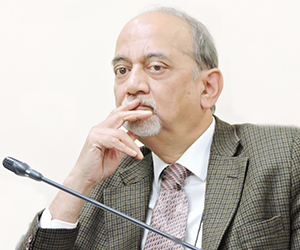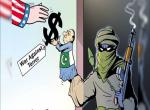The Pakistani Parliament in a joint session adopted a consensus resolution on 1st March reiterating Pakistan’s traditional position of confusing terrorism with self-determination. The resolution did not condemn Pulwama terror attack. It instead condemned India’s charge against Pakistan as ‘baseless’ and ‘politically motivated’, and guided by its ‘electoral calculations’.
The resolution also reflected Pakistani anguish at invitation to the External Affairs Minister Smt. Sushma Swaraj to attend the Organisation for Islamic Cooperation (OIC) Summit. It noted with ‘deep disapprobation’ that India was invited as a Guest of Honour at the OIC Foreign Ministers’ inaugural meeting.
The resolution was moved by Foreign Minister Qureshi, though the call for joint session of Parliament had come from the Opposition. During Saudi Crown Prince Mohammad Bin Salman’ visit, which took place after Pulwama attack, the Government did not invite opposition leaders to any official function or State banquet. Its rush to form national consensus after India’s counter-strike underlined its nervousness. It wanted political cover to ‘de-escalate’, as the last paragraph of the resolution called for.
Pakistan’s support to terrorism continues despite worsening economic situation. Visit of UAE Crown Prince to Pakistan in January and Saudi Crown Prince in February brought that country generous aid at a critical time. This lifted the mood. However, the report of State Bank of Pakistan (SBP) for first quarter of FY 2018 - 19 (Q1, FY19) has pointed out that the country’s macro-economic situation remains ‘challenging’. The period of report July-September 2018 coincides with inauguration of Imran Khan Government in August.
The report points out that large scale manufacturing contracted for the first time in seven years during Q1 FY 19. The effect was compounded by under-performance of the agricultural sector, as lower than average rainfall in the country aggravated the prevailing water shortages. The situation of water availability in Sindh is described as ‘alarming’.
The SBP report mentions that fiscal deficit remained high as revenue collection could not keep pace with growing current expenditure. Overall fiscal deficit reached Rs. 541.7 billion, which exceeded the corresponding figure for FY 18 by almost Rs. 100 billion. While export growth slowed down from 12.4 percent last year to only 3.8 percent in Q1 FY 19, the import bill went up due to 50.9 percent increase in global crude oil prices. There may be some fudging here, as after sharp increase in May-October period, crude prices started to decline November onwards.
After achieving a 13 year high growth of 5.8 percent in FY 18, Pakistan’s economy is showing signs of moderation. It may be mentioned that Pakistan follows July to June budget cycle. Hence high growth in FY 18 largely corresponds to last part of Nawaz Sharif’s term. Slowing growth will certainly limit Prime Minister Imran Khan’s elbow room to deliver on his promise for increased social spending in ‘Naya Pakistan’.
Karachi Stock Exchange dived from 40,506 on 14th February, the day of Pulwama attack to 38,821 on February 26th, the day Indian Air Force struck at Balakot. The next day it went down further to 38,692, when it became apparent that Pakistan had lost one F-16 in dog-fight with Indian Mig 21. Over the 1 year horizon, Karachi Stock Exchange has gone down by nearly 10 % from 43,829 to 39,539 points.
Deteriorating economy calls for restraint in foreign adventure. This sober reality is not reflected in Pakistani Army’s calculus in its relations with the neighbours to the East or the West. Afghan situation is in flux. Pakistan military relished its ‘front-line’ status during Cold War and earned handsome dividend in terms of military aid from US. Since 2001, despite generous US assistance, it has successfully undermined American effort to stabilize Afghanistan. As Trump Administration is getting ready to draw-down its forces, Pakistan continues to push Taliban, its protégé, to demand maximal terms. It is also unable or unwilling to restrain terror groups based on Pakistani soil from launching attacks on Iranian security forces.
What are the lessons Pakistan has drawn from Pulwama? It is too early to draw firm conclusions. But it is worth noting that after failing to deter Indian counter-strike by alluding to war, Pakistan called for ‘de-escalation’. It no longer has the comfort that nuclear threat could contain Indian reaction to action at the Line of Control (LoC). Indian pre-emptive counter-strike against terrorist camp in Balakot was in Pakistani territory. Will Pakistani Army exercise more control on terrorist groups on Pakistani soil in future? Should India get drawn in dialogue with Pakistan after Abhinandan’s release?
Pakistan’s concept of dialogue is based on use of force and terror, as we have learned in J&K. Prime Minister Imran Khan lauded Taliban’s dialogue with US and Russia in his speech as template for Indo-Pak relations. The talks in Doha and Moscow are accompanied by Taliban’s rejection of cease-fire offered by Ghani Government. For Pakistan terrorism and dialogue are two sides of the same coin.
Image Source: https://img.etimg.com/thumb/msid-68020472,width-300,imgsize-224574,resizemode-4/view-pulwama-terror-attack-is-a-wake-up-call.jpg











Post new comment